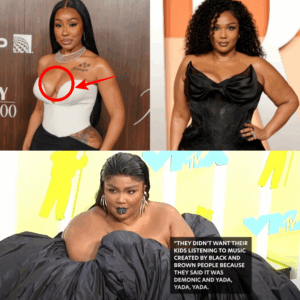“Lizzo Faces Online Hate: The Dark Side of Body Positivity and Fame!”
In the era of social media, few celebrities have sparked as much conversation—and controversy—as Lizzo. The Grammy-winning singer, rapper, and songwriter has become an icon for body positivity, self-love, and unapologetic confidence. However, her rise to fame has also brought a wave of online hate, much of it laced with racism and fatphobia. The backlash against Lizzo reveals the persistent prejudices that still exist in society and raises important questions about the price of visibility for marginalized artists.
.
.
.
.
Lizzo’s journey to stardom was anything but easy. As a plus-size Black woman in an industry that often prizes Eurocentric beauty standards, she has faced obstacles at every turn. Despite her undeniable talent and infectious energy, Lizzo has been subjected to relentless criticism about her appearance, her music, and even her right to occupy space in the spotlight. Social media platforms, while amplifying her message of empowerment, have also become battlegrounds where trolls and detractors feel emboldened to spew hateful comments.
One of the most high-profile incidents came in January 2020, when celebrity trainer Jillian Michaels questioned whether Lizzo’s body positivity was “celebrating obesity.” The backlash was swift, with many fans and fellow celebrities rushing to Lizzo’s defense. But the incident also exposed a deeper issue: the way society polices Black women’s bodies and the double standards they face. Lizzo herself responded with characteristic grace, emphasizing that her message was about self-love and health at every size, not about promoting any particular body type .

The criticism Lizzo faces is not just about her size—it’s also about her identity as a Black woman. Racist undertones often seep into the commentary, with some critics using coded language or outright slurs. In August 2022, socialite Kathy Hilton sparked outrage after mistaking Lizzo for “Precious,” the character played by Gabourey Sidibe in the 2009 film of the same name. The incident highlighted the ignorance and insensitivity that Black women in entertainment frequently endure .
Despite the hate, Lizzo remains undeterred. She uses her platform to advocate for inclusivity, mental health, and self-acceptance. Her music and public statements encourage fans to embrace their uniqueness and reject societal pressures. In a world that often tries to tear down those who dare to be different, Lizzo’s resilience is both inspiring and necessary.
Yet, the online hate she faces serves as a reminder that progress is not linear. For every step forward in representation and acceptance, there are still those who cling to outdated prejudices. Lizzo’s experience is a microcosm of the broader struggles faced by marginalized communities in the public eye. It underscores the importance of continuing to challenge harmful narratives and support those who push boundaries.
In conclusion, Lizzo’s story is one of triumph and adversity. She has achieved remarkable success, but not without paying the price of public scrutiny and bigotry. Her response to the hate—choosing self-love over self-doubt—offers a powerful lesson for us all. As society grapples with issues of body image, race, and representation, Lizzo’s voice remains a beacon of hope and change.
News
Heartbreaking: Hulk Hogan’s Last Wish Revealed—You Won’t Believe His Ultimate Regret!
Hulk Hogan’s Final Tragedy: Wrestling Icon Dies Estranged from Family, Never Meeting His Grandchildren July 2025 – The world of…
Astronomer Hires Gwyneth Paltrow—Her EPIC Response to Chris Martin’s Controversy!
Gwyneth Paltrow’s Ultimate Power Move: How She Turned Her Ex-Husband’s Joke Into Tech’s Most Brilliant PR Stunt Boston, 2025 In…
Leaked Footage SHOCKS Fans: Kristin Cabot & Billionaire Andy Byron in Hot Water After Coldplay Kiss Cam!
The $38 Million Kiss: How a Viral Coldplay Concert Clip Sparked the Most Expensive Scandal in Tech History Boston, July…
Melania BETRAYS Trump: Epstein Bombshell DROPS at the WORST Possible Moment!
Melania’s Revenge: Will Trump’s Wife Be the Ultimate Betrayer in the Epstein Scandal? She Was Never Loyal—And Now the Truth…
Elon Musk EXPOSES Trump’s Criminal Secrets—Ghislaine Coverup UNRAVELS LIVE!
When Justice Is for Sale: The Maxwell Gambit, Trump’s Power Play, and America’s Crisis of Truth Washington, August 2025 —…
King Charles SHOCKS Trump & Melania With LIVE TV Bombshell—Watch Trump Explode!
The Final Unraveling: Trump’s Epstein Inferno Reaches the Palace Gates August 2025, London/Washington — The wildfire of the Epstein scandal…
End of content
No more pages to load












